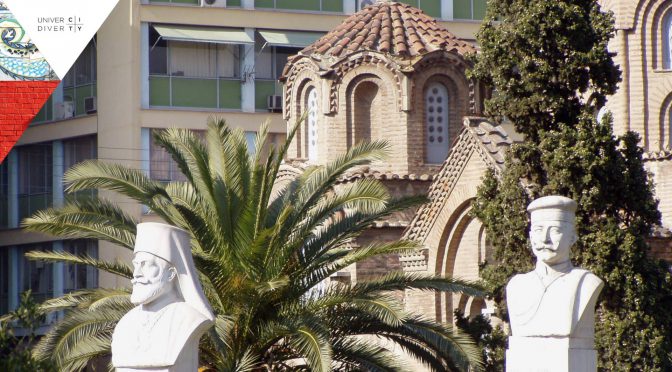
In the frame of FF UK Divesity week, the Institute of World History and its partners are organizing a workshop on “Identity Strategies: Heritage and Diversity”
Where: Hybernská 3, Prague 1 (room 303)
What do cultural patrimony, identity and diversity share in common? This question will be tackled during the workshop:
What strategies are in question when speaking about the choice and presentation of UNESCO monuments? Linda Kovářová, who compares the UNESCO monuments in the Czech Republic, Italy and Japan, will speak about this topic more in detail.
Aurore Navarro in her presentation about her research concerning retailers of so-called quality food in Prague is going to persuade us that identities go through our stomach: the food divides and unifies, delimits and designates.
Why the rich breton culture and tradition didn’t become the base for confident regional patriotism? Did the elites of Brittany choose a wrong strategy? Martina Reiterová is going to look for an answer to this question.
Alena Křivánková is going to reveal us who was interested in occitan at the beginning of the French Revolution and why this language didn’t become a link for southern French identity.
Jan Krajíček is going to present us technocratic dreams of František Radouš dating the 1930s, one of those being the idea that an underdeveloped and peripheral region like the Vysočina region constitute an ideal place for modernisation strategies.
Come and join us at this collective brainstorming!
In case you have other ideas, we would like to listen to them in the workshop.
Program
Linda KOVÁŘOVÁ (FF UK) UNESCO a koncept diverzity na příkladě Kutné Hory, Hirošimy a Villa Romana di Casale
Aurore NAVARRO (CEFRES/Université de Lyon) Food quality and retail trade in Prague: heritage, reinvention and innovation.
Martina REITEROVÁ (FF UK): Problematické dědictví? Identifikační strategie bretonských regionalistů přelomu 19. a 20. století.
Alena KŘIVÁNKOVÁ (FF UK): „Okcitánština“ – počátky vědeckého zájmu a sporů o jeden (?) jazyk
Martin THARP (FHS UK): Thomasius’ Legacy or the Language Paradox of European Universities
Jakub NEUMANN (FF UK): Proměny kladenské industriální krajiny ve 20. století
Jan KRAJÍČEK (FF UK): Periferní region jako technologický projekt: modernizace Vysočiny podle Františka Radouše (1939)
See the complete program with abstracts (in Czech) here.
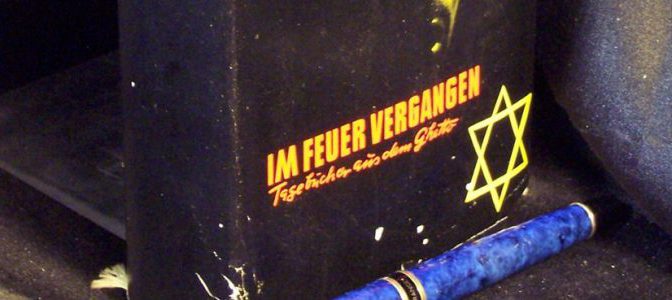
A lecture by Stephan Stach (Institute of Contemporary History, AV ČR) in the frame of the seminar on Modern Jewish History of the ÚSD AV ČR and CEFRES in partnership with the Jewish Museum.
Language: English
Abstract:
During the 1950s and 1960s a number of books on the Holocaust appeared in the German Democratic Republic. They had their origins in the Jewish Historical Institute in Warsaw, the only Holocaust research center in the Eastern Bloc. Among them was Bernard Mark’s Der Aufstand im Warschauer Ghetto (The Warsaw Ghetto Uprising, 1957; originally published in Polish in 1953), the collection of memoirs and diaries Im Feuer vergangen (Lost in the Fire, 1958) and the volume of documents Faschismus-Ghetto-Massenmord (Fascism, Ghetto, Mass Murder, 1960). These books constituted a considerable part of the literature on the Holocaust at the time. They were widely discussed in the press, where authors often used them as evidence of Nazi war criminals holding public office in West Germany at that time. Though their propaganda potential certainly increased the popularity of these publications, their impact went far beyond that. The publications were praised for their literary quality, for instance by the East German critics Victor Klemperer and Arnold Zweig, and met with the interest of the general reading public in East Germany. In my talk, I analyze the reception and perception of these books – and thus the Jewish Historical Institute – between Cold War propaganda and the emergence of an East German Holocaust memory.
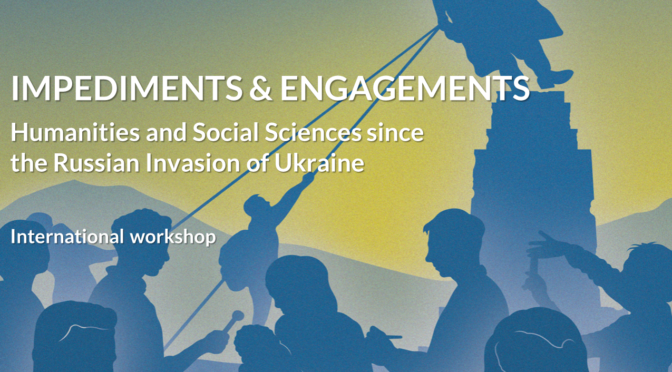
IMPEDIMENTS & ENGAGEMENTS. Humanities and Social Sciences since the Russian Invasion of Ukraine
International workshop within the program of the CEFRES non-residential fellowships for Ukrainian scholars in humanities and social sciences, 2023
Location: CEFRES, Na Florenci 3, Prague 1
Date: September 19–20, 2023
It is also possible to participate online. To receive the link, please register at cefres(@)cefres.fr
Language: English
Program
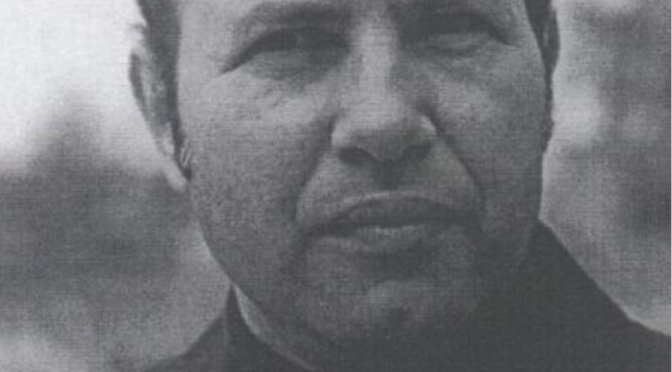
A lecture by Clara Royer (CEFRES) in the frame of the seminar on Modern Jewish History of the ÚSD AV ČR and CEFRES in partnership with the Jewish Museum.
Where: CEFRES library – Na Florenci 3, 110 00 Prague 1
When: 5 pm to 7 pm
Language: English
Abstract
To Imre Kertész, “Auschwitz” was the “Ecce homo” of two thousand years of European Christian culture. Such collapse of the so-called humanist culture led him to undertake a radical criticism of literature and of language. Analysing the totalitarian condition through his literary work, he strove to reconquer a free self through writing. Indeed, this existential practice enabled to become a creator, that is, to turn into the subject of his own creation. But how to create a work of art in such circumstances?
This lecture will try to cast some light on how Kertész strove to become “the Medium of Auschwitz” through a historical approach of the genesis of his literary work. It will appraise the historical and personal conditions of the birth of Kertész’s first published novel, Fatelessness.
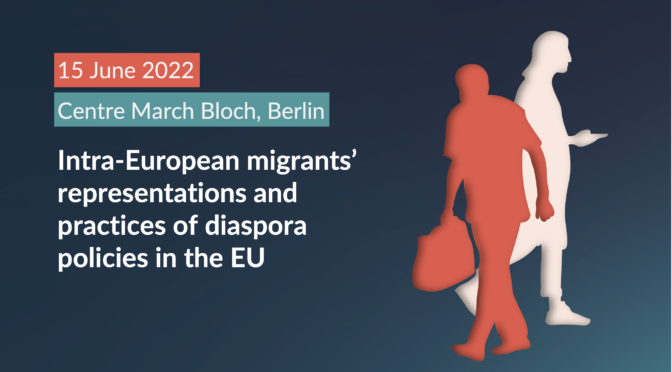
In the interstices of European citizenship. Intra-European migrants and national diaspora policies in the European Union. I.
The multidisciplinary research workshop is organised in partnership between the Marc Bloch Centre in Berlin and CEFRES in Prague. It aims to bring together specialists in migration, European citizenship and transnational political practices to discuss the question of the ordinary relations of intra-European migrants to the policies of diaspora implemented, according to very different modalities, by their country of origin.
Session I (15.06.2022): Centre Marc Bloch, Friedrichstraße 191 – Berlin
When: Wednesday 15th June, 14:30–18:00
Where: Salle Germaine Tillion, Centre Marc Bloch, Berlin & online on Zoom : https://us02web.zoom.us/j/88064656797
Language: English
Organised by:
Cédric Pellen (University of Strasbourg/Centre Marc Bloch in Berlin) CEFRES, Prague
You can download the updated program here.
See the description & program below.
Continue reading In the interstices of European citizenship (1) →
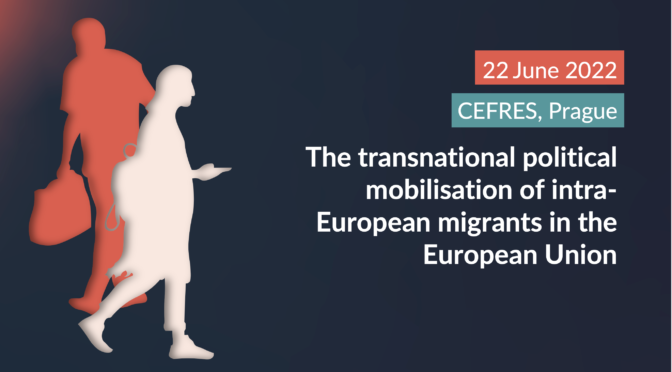
In the interstices of European citizenship. The transnational political mobilization of intra-European migrants in the European Union. II.
The multidisciplinary research workshop is organised in partnership between the Marc Bloch Centre in Berlin and CEFRES in Prague. It aims to bring together specialists in migration, European citizenship and transnational political practices to discuss the question of the ordinary relations of intra-European migrants to the policies of diaspora implemented, according to very different modalities, by their country of origin.
Session 2 (22.06.2022): CEFRES, Na Florenci 3 – Prague
When: Wednesday 22nd June, 14:30–18:30
Where: CEFRES Library, Prague & online on Zoom
https://us02web.zoom.us/j/85421454854
Language: English
Organised by:
CEFRES, Prague Cédric Pellen (University of Strasbourg/Centre Marc Bloch in Berlin)
You can download the updated program here.
See the description & program below.
Continue reading In the interstices of European citizenship (2) →






